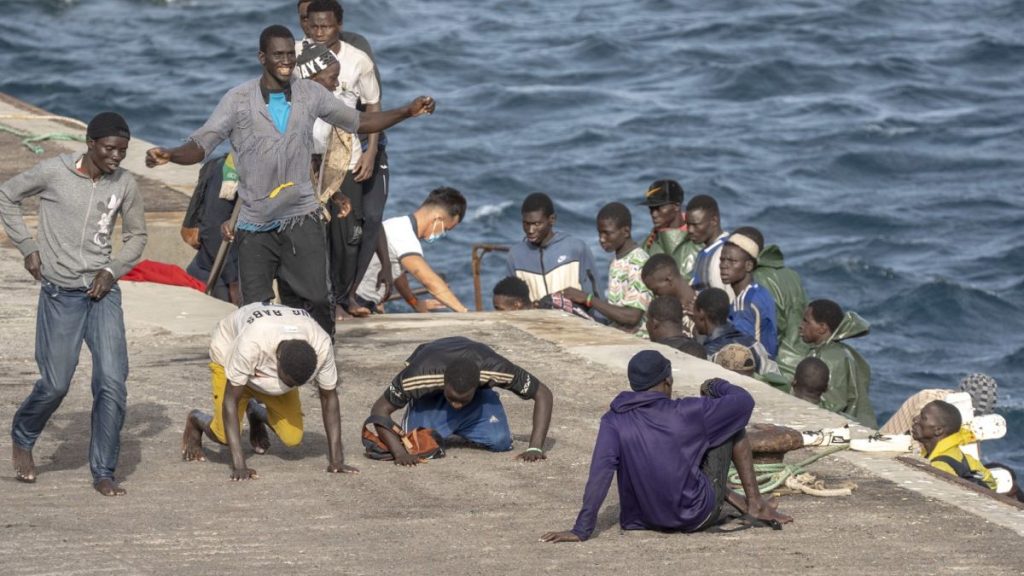The Canary Islands, a Spanish archipelago off the coast of West Africa, are experiencing a resurgence in migrant arrivals, echoing the challenges faced during the 2006 “Cayuco crisis.” In the first few days of the new year, over 780 migrants, including women, children, and individuals from sub-Saharan Africa and North Africa, arrived on the islands of Lanzarote and El Hierro. These arrivals foreshadow a potentially challenging year, following a 2024 that saw a record 63,970 migrants arrive irregularly on Spanish shores, with over 43,000 landing in the Canary Islands alone. This figure significantly surpasses the 31,678 arrivals recorded during the 2006 crisis, putting immense strain on local resources and prompting calls for both national and European solutions. The influx in Lanzarote necessitated the establishment of temporary shelters in the port of Arrecife, underscoring the immediate need for increased capacity to accommodate the new arrivals.
The rising numbers of migrants reaching the Canary Islands are part of a broader European migration challenge, prompting a shift in political discourse and policy within the European Union. Following the 2024 EU elections, a rightward shift in several member states has led to a renewed focus on migration control. This change in political climate has elevated migration to a top priority on the European Council’s agenda, leading to discussions and proposals aimed at addressing the issue at a continental level. The focus on border security and stricter migration policies reflects a growing concern among some member states about the social and economic implications of increased migration flows. The challenge lies in finding a balance between managing migration effectively and upholding humanitarian principles, ensuring the protection of vulnerable individuals seeking refuge or a better life.
European Commission President Ursula von der Leyen has proposed a two-pronged approach to address the migration issue: accelerating the return of asylum seekers whose applications are rejected and establishing detention centers in third countries. This latter proposal draws inspiration from a recent agreement between Italian Prime Minister Giorgia Meloni and Albania, suggesting a potential model for future partnerships. Von der Leyen’s proposals align with the requests of fifteen member states seeking to transfer asylum seekers to safe third countries, highlighting a growing consensus within the EU regarding the need for external processing of asylum claims. However, the feasibility and ethical implications of such offshore processing centers remain subject to debate and scrutiny.
Spain, bearing the brunt of the migrant arrivals in the Canary Islands, is also taking steps to manage the situation on a national level. The Spanish government has announced the opening of an emergency reception center at Ciudad Real airport to process asylum requests from irregular arrivals. This measure aims to streamline the asylum process and provide a more structured response to the influx of migrants. However, the focus on processing and potential repatriation raises concerns among humanitarian organizations regarding the treatment of vulnerable individuals, particularly unaccompanied minors. The increasing number of underage migrants arriving in the Canary Islands has prompted urgent calls for a more robust humanitarian response.
The situation in the Canary Islands underscores the complex and multifaceted nature of the European migration challenge. It highlights the interplay between national and EU-level policies, the need for effective border management, and the imperative to uphold human rights and provide adequate humanitarian assistance. The ongoing debate regarding the best approach to managing migration flows reflects a delicate balancing act between security concerns, economic considerations, and humanitarian obligations. The search for sustainable solutions requires a comprehensive and collaborative approach, involving not only EU member states but also countries of origin and transit.
Ultimately, the surge in migrant arrivals in the Canary Islands serves as a stark reminder of the ongoing human drama unfolding at Europe’s borders. The stories of individuals risking perilous journeys in search of safety and opportunity necessitate a compassionate and humane response. Addressing the root causes of migration, promoting international cooperation, and ensuring the protection of vulnerable individuals are crucial elements of a comprehensive and effective migration policy. The challenge for Europe is to find a way to manage migration in a manner that respects human dignity while also addressing the legitimate concerns of its citizens.














